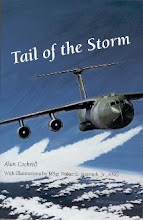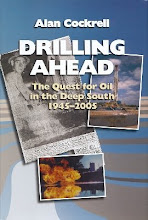Last Sunday night I headed south—way south. This was the last in a long sequence of qualification rides that occur after 767 transition school. First there was domestic operational evaluation, then the Europe route qual, which qualified me for the Hawaii routes, and now the final one, South America . Now I can take a 767 anywhere United operates them without a check airman to nursmaid me along. It’s a good feeling.
We left Dulles at 9:45pm with about 200 people and 60 tons of fuel, skirted offshore of the Carolinas and lost sight of the
I looked down and saw a few ghostly shadows below us in the Amazon valley but no lights—no sign of life for hundreds of miles. Up ahead on the horizon we saw flashes of lightning. I had been warned about the “dry cell” thunderstorms that occur nightly along the equator. They don’t show up on radar well, so you revert back to the way St. Exupery watched for them. You turn down the cockpit lights and use the moon as your lantern.
As we searched for a gap in the storms, we knew could not deviate west under any circumstances; the
No sweat, you say? If we got over them and lost an engine we would drift down into them in a matter of minutes. That would ruin a beautiful airplane.
Then Stu recognized a voice. It was a buddy on United flight 846. They had found their way through the storms. They told us to head east about 100 miles. Stu got permission from Amazonica Control and I cut toward the gap. Stu asked where they had eaten. “Café El Establo. Great steaks.” That was for us.
As we got closer the squall line treated us to dazzling light show and as we neared the gap we saw the lights of flight 846 coming out of the gap straight at us. I turned on my landing lights and then his appeared. He lit up like a super nova. Then he flashed underneath us heading north to where we left—Washington Dulles. We were flight 847 and we were headed to whence he came—
The day broke over northern

On the way in to town it struck me that for the first time in my career, though I had made many long flights, this was the first time I had traveled so far (5,175 miles) and could have done it in my car. No oceans crossed. This comes into perspective when you consider the same distance west from
I found BA to be an agreeable city. It was busy with traffic and pedestrians. It was colorful and laced with European architecture. Few of the locals spoke English but all were friendly. It was a pleasant stay and two nights later, with bellies full of Patagonian beef, we headed back north under a beaming moon, threaded the dry cells which were faithfully discharging their duty of guarding the equator, met flight 847 over the Amazon, and watched the dawn appear over the Chesapeake. It was a great trip, made better with the company of a good crew.
Cafe La Bieola, said to be owned by Robert Duvall
Bill comes back up before landing back at Dulles. He signed me off.







Finding a gap between the storms, navigating by moonlihgt, seeing the lights of a fellow captain as passes by, sounds like the life a sea captain! Sounds fun!
ReplyDeleteWow, dry cells, us ole GA pilots who have never been near the equator, have a lot to learn. Thanks for the education!
ReplyDelete